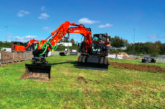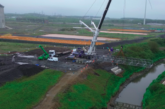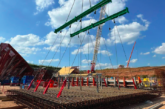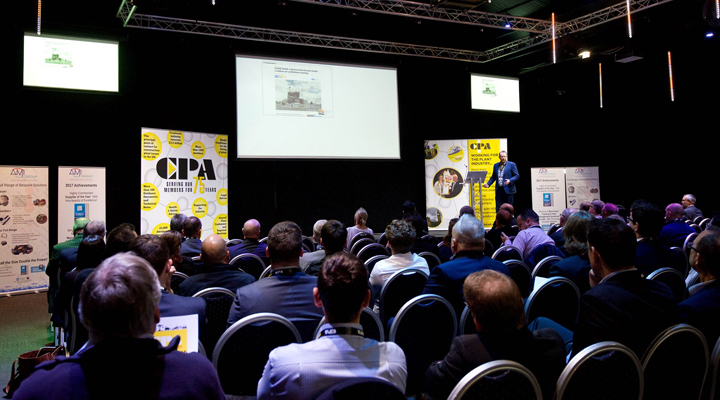
The key developments in construction plant hire were discussed at the CPA Plant Conference
Over 150 key contacts from the likes of A-Plant, CITB, Clee Hill Plant, Costain, GAP, the Health & Safety Executive (HSE), Highways England and Skanska attended this year’s Construction Plant-hire Association (CPA) Plant Conference which took place at the Heart of England Conference and Events Centre near Coventry.
The one-day event, which was held in association with headline sponsor AMI Group, had the theme of ‘Understanding and Influencing the Future of Construction Plant Hire.’ Held for the fourth consecutive year, the conference provoked interesting debate on important and business-critical developments in construction plant hire, such as air quality in London, supply and demand of plant operators and the effect of health on productivity.
There were a total of seven speakers, along with a dedicated exhibition area showcasing equipment and new products and services from AJ Gallagher, AMI Group, CanTrack, Datatag, ECY Haulmark, GenQuip, Hook-up Solutions, IPAF, Jaama, JCB, MCS Rental Software, Point of Rental Software, SKM Asset Finance, Select Plant Hire, Teletrac Navman and Trackunit.
Kevin Minton, Director of the CPA said: “We’ve had some excellent feedback about this year’s Plant Conference and the substantial list of attendees clearly demonstrated an appetite for discussion and networking. With delegates from hire companies, contractors, industry associations and government agencies, we welcomed more than 150 people to the event, comprising both CPA members and equally importantly non-members, to hear speakers discuss the ways in which we can understand and influence the future of our industry.”
Convenor John Batty from Bluejohn Marketing opened the Conference alongside Kevin Minton. The first presentation was delivered by Daniel Marsh from King’s College London who spoke about real-world emission measurement work for the London Low Emissions Construction Partnership and the Non-Road Mobile Machinery (NRMM) Low Emission Zone (LEZ) policy for London.
Daniel outlined headline figures, such as 9,400 attributable or premature deaths in London as a result of London’s air quality and the fact that 37 out of 43 zones in the UK have air quality levels which regularly exceed legal limits. Daniel spoke about the action being taken to reduce emissions from NRMM to protect and improve Londoners health and the introduction of Stage IV emissions standards for non-road engines used across London’s Central Activity Zone (CAZ), Canary Wharf and Greater London from 1st September 2020, plus subsequent Stage V standards.
Carl Letman from Skyblue Research spoke about the research carried out on behalf of the CPA to examine the supply and demand of plant operatives in the construction industry, to provide better data which can be used for planning and implementing recruitment and upskilling programmes in both general and specialist plant construction operative areas. Carl outlined that two of the biggest challenges for the construction plant industry over the next five years are ageing workforces and the difficulty of recruiting young people into the industry, and lack of access to skilled and experienced workers due to the emergence of new plant operators coming through that have not got the relevant skill levels to work on sites.
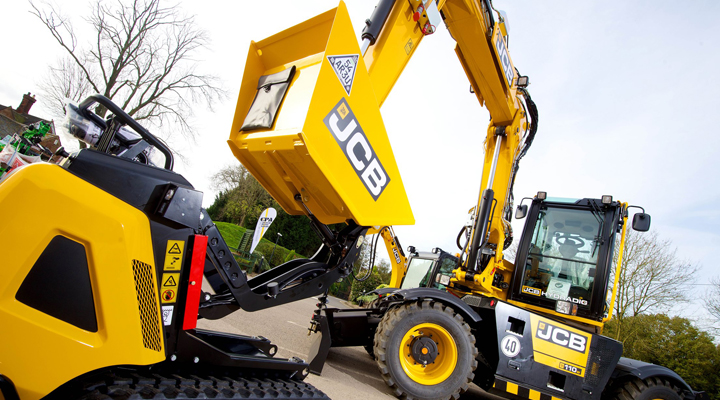
Mark Noonan, Industry Relations Director at the CITB, spoke about approval for the CITB’s Levy Order and changes which are taking place on the CITB landscape, such as the reformation of the grants scheme, plus the introduction of support systems including a centralised training directory, a national register and automated grant payments. Mark outlined key objectives moving forward, such as reducing the time it takes to enable individuals to add value to the workplace and the accessibility of training in multiple formats which take account of emerging learning technologies, such as immersive learning, thereby ensuring more employers train and that the training is relevant.
Kate Walker of Diabetes & You spoke about the effect of health on productivity, as a total of 650,000 employees in the UK phone in sick every week. Kate’s presentation specifically analysed the problem of diabetes, as diabetes can present as an invisible condition for years until people start to see the damage that it has been causing. It is predicted that by 2035-36, a total of £39.8 billion will be spent on costs associated with diabetes. Kate spoke about the need for a joint strategy is to locate the 940,000 undiagnosed people, followed up by education and ongoing support to sustain wellbeing and create empowered people, thus saving lives, giving people quality of life and empowerment and decreasing sick days and increasing productivity.
The afternoon’s speaker sequence commenced with Carole Bardell, HS2’s Head of Health, Safety and Security, who delivered an insightful presentation on HS2, the new high-speed railway and HS2’s vision to be a catalyst for growth across Britain. Carole spoke about the aim to more than double the amount of seats for rail travel from London Euston, Manchester Piccadilly and Leeds by 2033, and outlined HS2’s ‘Safe at Heart’ campaign and the Supply Chain Standard for Health and Safety.
The next speaker was Tim Watson, Technical Consultant for the CPA, who analysed how the supply chain can work together to make sites safer. Tim outlined a series of important statistics, such as over 80% of accidents may be attributed, at least in part, to the actions or omissions of people (HSG 48 Reducing error and influencing behaviour) and that 43 workers were fatally injured in the construction sector in 2015/2016. Tim spoke about the benefits of industry guidance and outlined the availability of over 130 items of plant related guidance documents which can be downloaded freely from www.cpa.uk.net/publications/, plus the launch of new guidance such as the Strategic Forum Plant Safety Group’s (SFPSG) recently launched guidance on Reducing Unintended Movement of Plant.
The final speaker at the event was convenor John Batty of Bluejohn Marketing who analysed what challenges 2018 will bring to businesses in construction plant hire. John referred to factors such as an increasingly ageing skilled workforce, the lack of industry appeal for young people and the inability to attract, train and retain quality young employees. He talked about the need to consistently engage with young people from an early age and to integrate education into construction and vice-versa.
Kevin Minton, CPA Director concluded: “It was pleasing to see so many people at the conference, new delegates and previous visitors and returning sponsors. We try to make the conference the event for debate about issues that will affect our industry – those issues could include working practices, health and safety, productivity, people and skills. But before any policy is made, or any intervention planned, we need proper understanding of where we are and what we might face. At the CPA, we want to work with industry to allow people and businesses the scope to fulfil their potential and the conference afforded the opportunity to hear about some of the pathways towards that goal.”
For further information on the Construction Plant-hire Association (CPA) click here




